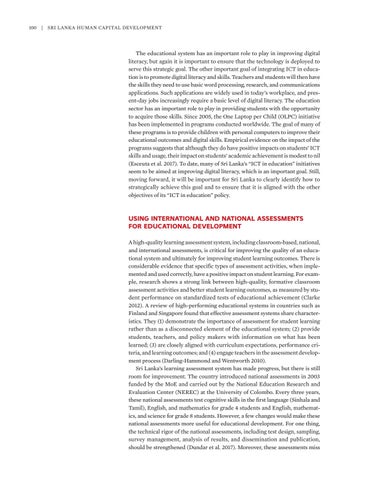100 | Sri Lanka Human Capital Development
The educational system has an important role to play in improving digital literacy, but again it is important to ensure that the technology is deployed to serve this strategic goal. The other important goal of integrating ICT in education is to promote digital literacy and skills. Teachers and students will then have the skills they need to use basic word processing, research, and communications applications. Such applications are widely used in today’s workplace, and present-day jobs increasingly require a basic level of digital literacy. The education sector has an important role to play in providing students with the opportunity to acquire those skills. Since 2005, the One Laptop per Child (OLPC) initiative has been implemented in programs conducted worldwide. The goal of many of these programs is to provide children with personal computers to improve their educational outcomes and digital skills. Empirical evidence on the impact of the programs suggests that although they do have positive impacts on students’ ICT skills and usage, their impact on students’ academic achievement is modest to nil (Esceuta et al. 2017). To date, many of Sri Lanka’s “ICT in education” initiatives seem to be aimed at improving digital literacy, which is an important goal. Still, moving forward, it will be important for Sri Lanka to clearly identify how to strategically achieve this goal and to ensure that it is aligned with the other objectives of its “ICT in education” policy.
USING INTERNATIONAL AND NATIONAL ASSESSMENTS FOR EDUCATIONAL DEVELOPMENT A high-quality learning assessment system, including classroom-based, national, and international assessments, is critical for improving the quality of an educational system and ultimately for improving student learning outcomes. There is considerable evidence that specific types of assessment activities, when implemented and used correctly, have a positive impact on student learning. For example, research shows a strong link between high-quality, formative classroom assessment activities and better student learning outcomes, as measured by student performance on standardized tests of educational achievement (Clarke 2012). A review of high-performing educational systems in countries such as Finland and Singapore found that effective assessment systems share characteristics. They (1) demonstrate the importance of assessment for student learning rather than as a disconnected element of the educational system; (2) provide students, teachers, and policy makers with information on what has been learned; (3) are closely aligned with curriculum expectations, performance criteria, and learning outcomes; and (4) engage teachers in the assessment development process (Darling-Hammond and Wentworth 2010). Sri Lanka’s learning assessment system has made progress, but there is still room for improvement. The country introduced national assessments in 2003 funded by the MoE and carried out by the National Education Research and Evaluation Center (NEREC) at the University of Colombo. Every three years, these national assessments test cognitive skills in the first language (Sinhala and Tamil), English, and mathematics for grade 4 students and English, mathematics, and science for grade 8 students. However, a few changes would make these national assessments more useful for educational development. For one thing, the technical rigor of the national assessments, including test design, sampling, survey management, analysis of results, and dissemination and publication, should be strengthened (Dundar et al. 2017). Moreover, these assessments miss




